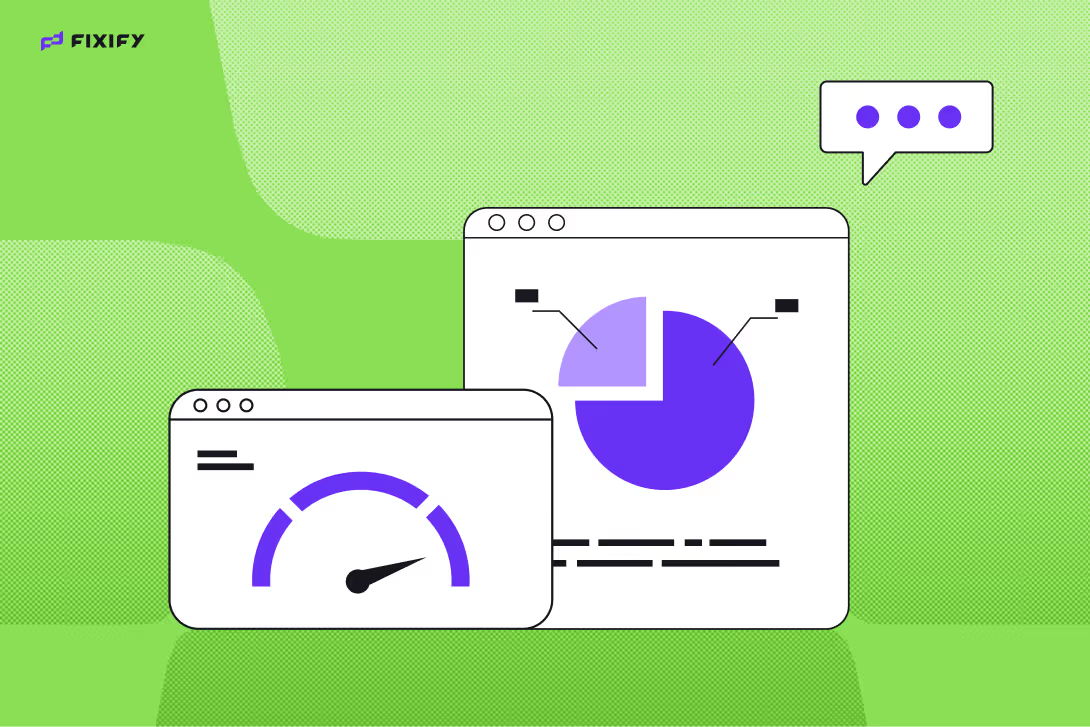IT vs engineering: What’s the difference (and why it matters)

.avif)
Listen to this blog as a podcast

.avif)
It happens all the time: someone pings the engineering team with a laptop issue. Or asks the IT team to debug a product bug.
But those two teams? They do very different jobs.
Understanding the difference between IT and engineering isn’t just semantics — it’s key to helping each team stay focused on the work that matters.
Here’s how the roles differ, where they overlap, and how Fixify helps both teams avoid distractions and stay productive.
What does the IT team do?
The IT team is your internal operations crew. Their job is to support the business — making sure employees have what they need to work efficiently and securely.
Core focus: Operational support
IT owns the infrastructure that employees rely on every day. That includes laptops, network access, user accounts, and internal software systems. When something breaks or someone needs help, IT steps in.
They’re focused on keeping systems running smoothly and making sure the tools people use actually work.
Typical responsibilities
Let’s break down what’s expected:
- Managing employee devices (laptops, phones, monitors)
- Handling help desk requests and troubleshooting
- Setting up new hires and offboarding departing employees
- Managing access to tools and data
- Enforcing security protocols like MFA and password policies
For a deeper look at team makeup, check out how we think about the IT support team structure.
What does the engineering team do?
Engineering teams build the product — or the technology that powers the business. That could be a customer-facing app, a data platform, or internal tools used by other teams.
Core focus: Product development
Engineers write code, maintain infrastructure, and fix product bugs. They’re responsible for building new features, improving performance, and ensuring the product or system scales as the business grows.
They’re also typically involved in architecture decisions, system design, and tool selection.
Typical responsibilities
Let’s break down what’s expected:
- Designing and building software features
- Maintaining codebases and tech stacks
- Troubleshooting product bugs
- Managing CI/CD and development pipelines
- Owning infrastructure in DevOps or platform roles
In some orgs, engineering also supports internal developer portals or custom automation that helps other teams move faster.
Where IT and engineering overlap
In reality, the line between IT and engineering isn’t always clean — especially in smaller companies or fast-moving teams. Here’s where things often blur.
Shared tools and responsibilities
Both teams might touch:
- Access control systems (like Okta or Azure AD)
- Shared infrastructure (VPNs, internal apps, networking)
- Troubleshooting outages or performance issues
In many orgs, when IT is overloaded, engineering becomes the fallback. And when engineering needs something urgently — like a cloud permission — they often reach out to IT.
This is also where shadow IT creeps in: tools spun up without central visibility, creating more work for both teams later.
Different priorities
The key distinction isn’t what tools they use — it’s what they’re optimizing for.
IT focuses on stability, uptime, and user experience. Their goal is to keep people productive.
Engineering focuses on speed, scale, and technical excellence. Their goal is to ship, improve, and evolve the product.
When both teams are clear on those roles, they can collaborate more effectively. When they’re not? It leads to distractions and delays.
The problem: too much cross-pull, not enough focus
When IT and engineering get stuck picking up each other’s slack, everyone loses momentum.
Context-switching kills productivity
If an engineer is pulled into a support request about permissions, they’ve lost time that could’ve gone toward feature development. If IT is stuck manually provisioning 15 accounts a week, they don’t have time to improve systems.
Constant interruptions reduce output and drain energy from both teams.
Burnout risk increases
Both IT and engineering operate with lean teams. They're constantly managing expectations, responding to requests, and juggling priorities. Without clear boundaries and support systems, the stress adds up.
Eventually, things fall behind. Or worse — people leave.
How Fixify supports both teams
Fixify was built to take the busywork off your plate — whether that plate belongs to IT or engineering.
Freeing up IT from repetitive support
We handle high-volume, low-complexity tasks that eat up IT time, including:
- Password resets
- Access provisioning
- App installations
- Onboarding workflows
These tasks are predictable. They don’t need escalation. They just need to get done, quickly and accurately. Fixify makes that happen — with no new tools or retraining required.
We also give IT the visibility to see what’s working, what’s slowing down, and where they can improve.
See how our AI help desk combines smart automation with human empathy.
Keeping engineering focused on engineering
No more “Hey, can you add this person to GitHub?” pings.
Fixify routes and resolves common asks like permissions, access, and troubleshooting — so your dev team can stay heads-down and focused.
We don’t force engineers into a ticketing system they hate. We integrate with the tools they already use, and remove friction without adding new overhead.
This kind of support helps platform and SRE teams too. Fixify handles requests that would otherwise slow down pipelines or create bottlenecks — especially in DevOps environments.
Insights to improve shared systems
Fixify doesn't just work the queue — we surface patterns across support, usage, and satisfaction.
That data helps IT and engineering:
- Spot common blockers
- See which tools or systems generate the most tickets
- Prioritize fixes that reduce downstream noise
For orgs using ITSM solutions, Fixify plugs into your workflows and extends your team’s reach without creating silos.
Different jobs, same goal
IT and engineering teams have different jobs — but they’re both building the foundation your company runs on.
When each team stays in their lane, everyone moves faster. Fixify helps make that possible. We clear the repetitive work, surface the right insights, and help both teams do what they do best.
Ready to unstick your IT and engineering teams?
Related articles

Outsourced IT help desk services: What we hear seasoned IT leaders wish they knew sooner

.avif)
Cybersecurity is a wicked learning environment


Measuring IT help desk performance: 7 metrics that actually matter

Stay in the loop

Sign up to get notified about our latest news and blogs
.png)